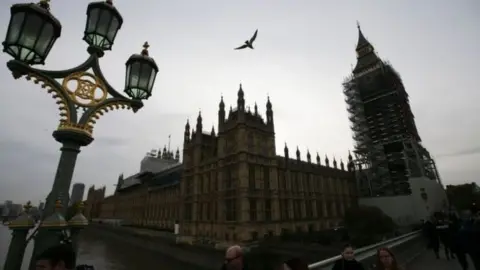NI to offer unrestricted abortion up to 12 weeks
 Getty Images
Getty ImagesAbortions in Northern Ireland can take place in the first 12 weeks of pregnancy "without conditionality", under new laws soon to be in force.
Terminations will be permitted beyond 12 weeks in a number of other circumstances, with no time limit in cases of a fatal foetal abnormality.
In 2019, abortion was decriminalised in NI by MPs at parliament.
The government published regulations regarding the provision of services that will come into effect next week.
Currently there is no statutory framework permitting lawful abortion and until recently, abortions in Northern Ireland could only be carried out in very limited circumstances.
The document sets out that terminations will be allowed “without conditionality” in the first 12 weeks of a pregnancy.
It said that was to ensure that victims of sexual crime – rape and incest – could get access to services.
A limit of 24 weeks will apply in circumstances where continuing the pregnancy would involve risk of injury to the woman’s physical or mental health, greater than the risk of terminating the pregnancy.
The regulations state that no time limit will apply in cases of fatal fetal abnormality, where there is a substantial risk that the fetus would die or if born would suffer a severe mental or physical impairment.

The government said this decision had been taken to ensure it mirrored similar provision in Great Britain, arguing that a different time limit in Northern Ireland meant “women and girls would effectively be left with no choice but to travel to other parts of the UK for a termination”.
No time limit will apply either for an abortion if there is a risk to the life of the mother, greater than if the pregnancy were terminated – or, the government says, “where necessary to prevent grave permanent injury to the physical or mental health of the pregnant woman or girl, including in cases of immediate necessity”.
Conscientious objection
The framework also sets out those medical professionals who can perform an abortion, citing a doctor, a registered nurse or a registered midwife.
It adds that conscientious objection will apply, meaning those medical professionals who do not want to participate in carrying out a termination will not be obliged to do so.
“The only exception will be where the participation in treatment is necessary to save the life or to prevent grave permanent injury to the physical or mental health of a pregnant woman or girl,” the framework added.
In order for a termination to take place, one medical professional will be required to certify the pregnancy has not exceeded 12 weeks, or that a termination is immediately required.
Terminations on other grounds will require the certificate to be signed by two medical professionals.
Regarding where abortions can take place, the framework makes provision for terminations to be carried out in GP premises, clinics provided by a health and social care trust, and HSC hospitals.
The regulations also provide a power for Health Minister Robin Swann to be able to approve further places where abortions can be performed, with the power being able to be exercised at any point in time.
If a pregnancy is terminated outside of the circumstances stated in the framework, it will be deemed a criminal offence punishable with a fine of up to £5,000.
 Chinnapong
ChinnapongCareful assessment
The Northern Ireland Office (NIO) has created the framework following on from a public consultation it carried out last year.
It said more than 21,000 responses were received, and that groups it engaged with included the Department of Health, healthcare professionals, Royal Colleges, the all-Ireland church leaders group, abortion service providers, trade unions and civil society organisations, and individuals with lived experience.
It said 79% of respondents “expressed a view registering their general opposition to any abortion provision in Northern Ireland beyond that which is currently permitted”.
A number of specific questions were posed to respondents about what the initial time limit should be set at.
The government said: “Some organisations, including some professional medical bodies, strongly advocated for unrestricted abortion without conditionality up to 24 weeks gestation, whilst others expressed the view that the proposals had gone too far.”
The government said the views were carefully assessed, “recognising the strength of feeling expressed by many”.
However, it added that it remains under a legal obligation to introduce a framework, in line with recommendations made in a way that implements the recommendations of a UN committee - the Committee on the Elimination of Discrimination against Women (CEDAW).
It also said decisions were also made on the basis that, where legally possible and whilst being responsive to the unique circumstances in Northern Ireland, the provisions do not stray too far from the abortion service model in England and Wales.
The NIO added that it will be for Stormont's Department of Health to take forward provision of counselling and other support services for women and girls as it undertakes abortion as a new healthcare service in Northern Ireland.
Although a “large number” of respondents said the law should permit women to take abortion pills at home - allowing women and girls to take the second pill at home up to 10 weeks in line with Great Britain, the government has chosen not to add that to the framework.
It said women and girls will be able to go to GP clinics that wish to provide the service, as well as sexual and reproductive health clinics.
In 2019, the government decided to allow women in Northern Ireland to access abortions in England, ahead of the new framework coming into place.
It says that arrangement will continue after 31 March 2020 – “until we are confident that service provision in Northern Ireland is available to meet women’s needs”.
